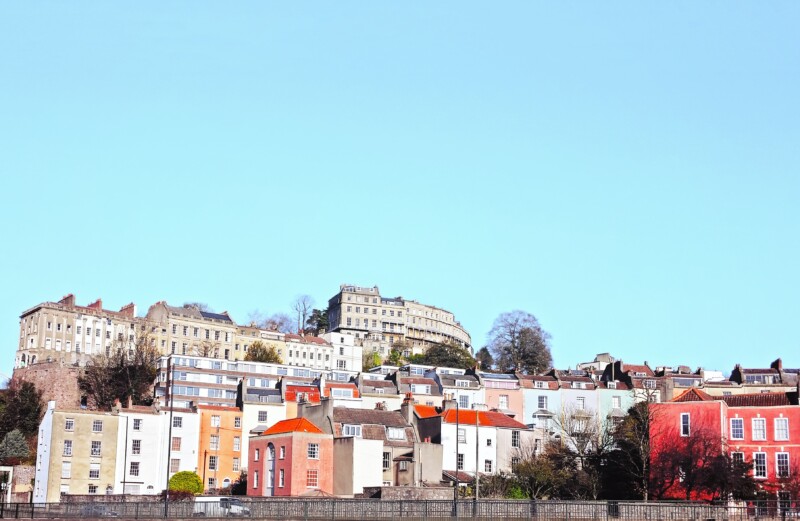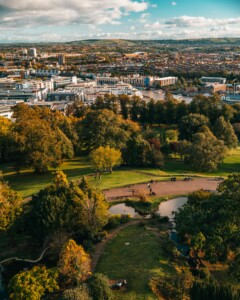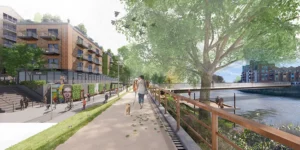Can Bristol Take Control of Its Destiny Without Becoming Insular and Elitist?

Share this
Aristotle argued that the human being is a political animal. We are naturally social beings, and so just as naturally ‘when several villages are united in a single complete community, large enough to be nearly or quite self-sufficing, the state comes into existence.’ For Aristotle, the stateless individual is like an ‘isolated chess piece’, what Homer called ‘Tribeless, lawless, hearthless’.
However, though it is natural to form ourselves into civic units, what form they take and how they are governed is a matter of human artifice. There is no single political model all humanity has adopted. Humans have lived in tribes, fiefdoms, federations, kingdoms, empires, communes, republics and more.
In recent decades, the city has re-emerged as a preferred key unit of political organisation. As the borders of countries have tended towards greater openness and national governments have come to be seen as more and more remote, calls for devolution have grown louder. In the UK, this has centred mainly on the constitutive nations of the United Kingdom. But regions have also been mooted as new centres of power, as have cities and their suburbs. Attempts to establish metro mayors have had mixed results but not so long ago few would even have taken the idea seriously.
One vision of a future Bristol seizes on the potential for it to become a more autonomous city region. Bristol has for a long time prided itself on its independent spirit, championing the local against the might of the national and multinational. The opening of a Tesco Metro store on the street with reportedly the highest proportion of independent businesses in the country was enough to provoke a riot. The experiment with a local currency – the Bristol Pound – ultimately failed but again testifies to the desire for more local self-determination.
One inspiration for this is Preston in Lancashire, which promotes ‘Community Wealth Building’ by measures such as increasing local procurement and supporting local employers. The ‘Preston Model’ has been judged a success by many, but the Bristol Pound story is a cautionary tale about the right lessons to learn. It was born of a laudable desire to encourage wealth to stay within the city and to prevent profits being creamed off by national and multinational companies and institutions. Its main practical problem was that it added another layer to financial transactions that made them more expensive to administer. If keeping money local requires spending more of it, then the benefits to locals are questionable.
At a more philosophical level, the idea of drawing a ring around the city’s wealth seems misguided. It’s the opposite of shutting the gate after the horse has bolted: more like raising the drawbridge once all the horses have been rounded up inside. Whereas Preston was a struggling post-industrial town with good reason to keep and generate more wealth for itself, Bristol is a thriving city which is and has sucked in wealth from outside, through its trade, both legitimate and exploitative. Tobacco helped build the city and in more recent years the international appeal of its creative, aerospace and other industries has put the city on the map. The BBC’s Natural History Unit, Aardman Animations and Airbus, for example, are Bristol success stories because they sell around the world in dollars and euros, not Bristol Pounds.
Similarly, many of Bristol’s best ethical businesses are ethical precisely because they trade fairly with people from far away. Our many excellent coffee roasters buy their beans from farmers in the Americas, Africa, even India and China. Our first bean-to-bar chocolate maker doesn’t source its cacao from Cotham.
Closer to home, there is also a risk that the focus on the city creates an artificial and pernicious divide between Bristol and the wider South West region. Think of all the cafés and restaurants that pride themselves on their local sourcing. Almost all of this comes from further afield than the Metro Mayor’s turf: Bristol, South Gloucestershire, Bath and North East Somerset. Without food from Somerset, Devon, Gloucestershire, Wiltshire and South Wales a locavore diet would be severely limited. I am a big fan of the cheese Wandering Ewe, made in Failand, but the producers can barely keep up with demand from local cheese lovers, let alone feed the whole city. There is a growing interest in urban farming, but it is not a credible path to self-sufficiency in the foreseeable future.
Just as the city is dependent on the wider region, so the wider region is dependent on the city. Many come here to work, play, study or for medical care. We are interdependent, from the neighbourhoods to the global level.
But these are not always symmetrical relationships. The coffee farmers who are dependent on artisan cafés and their customers earn a good deal less than both. And the professional middle-classes, more numerous in cities, typically earn more than the rural farmers and cheesemakers whose fare they happily enjoy. Rocketing property prices mean that the less well-off are increasingly priced out of the city, turning into lower-paid service workers living in dormitory towns. The worry is that an increasingly confident, affluent and independent city would be parasitic on the poorer elsewheres that service it. Autonomy is far from noble when it in effect means a power-grab by the already better off.
As well as an economic divide, there is also a growing cultural one. As recent elections and the Brexit referendum showed, the country is increasingly polarised between urban, on average more educated, mobile, cosmopolitan liberals, and the on average more settled, less educated, conservative dwellers of smaller towns and villages. David Goodhart called these two tribes ‘anywheres’ and ‘somewheres’ respectively. In my book about the philosophy of the English, Welcome to Everytown, I called them liberal cosmopolitans and conservative communitarians. If being Bristolian becomes a stronger identity, associated with the ‘anywhere’ values of liberal cosmopolitanism, this cultural divide could deepen, further fracturing our already fissiparous nation. It is very easy for pride in our inclusive values to bring with it condescending disdain for those who don’t share them.
Is there a way for Bristol to take more control of its own destiny without becoming more narrow, insular and elitist? It’s a question that could be asked of any would-be city-state. It requires an answer because without one the risk is that a more autonomous future will be unsustainable and unjust.
A ‘People’s Republic of Bristol’ could thrive if it had justice built into its constitution. Some such binding document would probably be necessary to avoid the city’s future charting an ever-changing and inconstant course due to changes in political leadership.
First, it would have to guarantee basic rights to its citizens in ways that the British state has failed to do. Minimum wages would remain a matter of national policy, but they do not provide a living wage in a thriving metropolis. To make life good for all, Bristol would have to make several public service commitments. For example, taking as its model cities like Vienna, it could massively increase its social housing provision to ensure that everyone had a decent home and was not either priced out altogether or ‘priced in’ to pokey, poor-quality dwellings. Add to this good public services, transport, leisure centres, libraries and parks and Bristol could avoid becoming a rich person’s playground serviced by a marginalised poor.
Second, it should guarantee a fair deal for those it trades with. Around the world there are hundreds of Fairtrade cities (including Bristol), villages, zones, boroughs, counties and universities committed to the promotion of Fairtrade certified goods. Since only a few product categories are certified and there are many more ways of trading fairly than are covered by the scheme, there is a pretty low bar for joining. However, it could serve as a prototype for a more ambitious commitment to offer a fair deal for everyone who supplies the city with what it cannot itself produce. Obviously, any local government would be limited in how far it could go down this road and could not control the private purchasing decisions of Bristolians. But by itself adhering to certain standards and certifying businesses that do the same, it could go a long way to making the prosperity of Bristol good for everyone that deals with it.
Third, as part of the United Kingdom, the price of greater autonomy should be a redistribution of some of any extra wealth Bristol earned. To a certain extent this already happens because of central government taxation: richer areas subsidise poorer ones. But this redistribution is uneven. Most notably, the government spends £550 more per head per year in London than it does in the rest of England. Bristol would owe it to the rest of the nation to ensure that more autonomy does not stop it contributing its share to ‘levelling up’ the whole nation.
How politically viable is such a set of commitments? If the desire for more autonomy is driven by nothing more than the wish to keep more of our money, then the answer is: not very. But I don’t think that is what motivates most supporters of greater independence. They want Bristol to be a good global citizen, not a haven for the privileged. To the extent that people seek self-interest, the basic service guarantee should provide more than enough reassurance.
Greater city-based devolution would be unprecedented in the UK and would require political innovation. Any plans for Bristol to lead the way need vision and imagination, both to make plans practical and inspire Bristolians to embrace this untested future. It could be done. The key question is whether it should.

Julian Baggini is a philosopher, journalist and author. He has served as Academic Director of the Royal Institute of Philosophy and is an Honorary Research Fellow at the University of Kent.
This article appears in Bristol 650: Essays on the Future of Bristol, a book bringing together essays from over 30 contributors, addressing some of the challenges the city faces and sharing ideas about how we might meet them. From dealing with the past, the future of social care, culture and housing to building a city of aspiration, the book looks to promote learning about the future of Bristol and encourage new ideas to come forward.
Free copies of Bristol 650: Essays on the Future of Bristol will be available at selected Festival of the Future City events in October 2023, or you can find articles featured in the book at bristolideas.co.uk/bristol650book.



